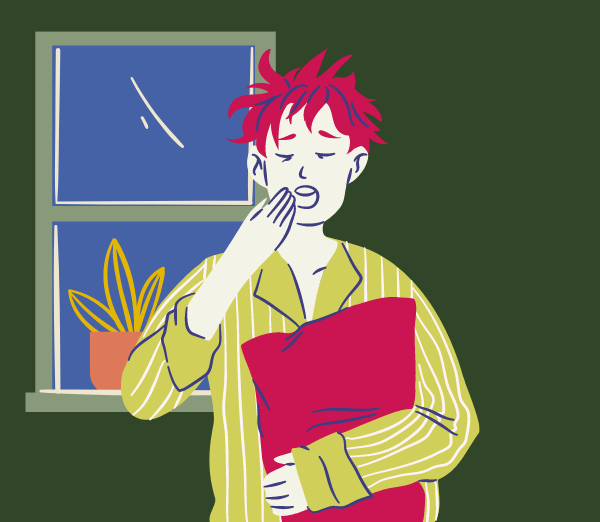Why sleeping is the secret to thriving and how to make it happen
February 23, 2021
I have taken sleep for granted for a long time.

For as long as I can remember, I have always passed out as soon as I got into bed at night. I didn’t think about it. I slept, dreamt and I woke up the next morning without thinking about the eight hours prior.
That is, until recently. After over a week of only sleeping about three to five hours per night, I can safely say that sleeping is an essential life ingredient.
Without a healthy amount of sleep, I began to shut down. My brain was not equipped to form rational thoughts, let alone complete assignments or have thoughtful conversations required in college classes. I constantly cried because I was too tired to face a situation that presented any sort of emotional challenge. My whole body hurt, and I began to feel sick as if I had the flu.
During this difficult time, I did an extensive amount of research on sleep, trying to figure out a way to fall asleep. Sleeping was all I wanted and yet it seemed impossible. Every time I laid down, all I could think about was the logistics of breathing — was I breathing too hard? Too soft? My mind raced with images of Google documents, Slack channels and Twitter threads that didn’t end.
If this is somehow relatable, I am so sorry. Not sleeping is a very underrecognized struggle. By the end of my week of restless nights, I was ready to start an insomniacs awareness organization simply because I don’t think people who can’t sleep get enough credit for their ability to function.
I don’t identify as an insomniac, but I have renewed respect for those that do. I pulled out of my misery and have luckily slept much better the past several nights. But, how?
Here are some of the tips and tricks I tried for sleeping that I found made a big difference in my struggle for Z’s.
-
- Use your phone less during the day: I know it’s common knowledge that you shouldn’t use your phone right before bed. However, in my sleepless state, I found myself stressing out about text conversations or social media posts that I saw earlier in the day. In order to work on my sleep, I use the “Screen Time” function on my phone which makes all of my apps inaccessible during the day. I can ignore the function if I really need to check something, but the fact that every app is at least temporarily inaccessible prevents me from mindlessly clicking on things that could inadvertently lead to stress and thus sleepless nights.
- Exercise during the day: I never used to be as sedentary as I am right now but thanks to a combination of COVID-19 making me fear the gym and the snowy weather, I have exercised less than ever before. Research from Hopkins Medicine shows that exercising 30 minutes a day will help with sleep that night. If you find yourself in my situation with few options to exercise, try an exercise video in your room. There are a lot of free yoga and Zumba classes on YouTube. If you aren’t into that structure, just hold a dance party in your room. Put on some headphones, close your door and your blinds (for dignity’s sake) and pretend you are at the club.
- Stop doing homework at least two hours before bed: I find my dreams are usually influenced by what I do a few hours before I sleep. My dreams about the homework I did right before bed led to me waking up in a cold sweat of stress. Since then, I have stopped doing homework — even if I have a lot — two hours before bed because I know failing to sleep will actually prevent my ability to function the next day. In those two hours, I have instead made it a habit to do yoga, read a book or talk with my roommates.
- Take a natural sleep aid: After my body built up a surprising and frightening tolerance to the average melatonin supplements, I have started to look outside the box. I am against turning to sleeping pills and Benadryl because I think it is important to find natural options. CVS stocks a hemp sleep supplement that has melatonin as well as cold-pressed hemp seed oil. I found this more effective than regular melatonin. That pill is best for occasional sleeplessness so after I tried that for a few days to get myself back in the rhythm of sleeping, I transitioned to a stress comfort gummy for both sleep and restful sleep. On top of melatonin, it has lavender which is an herb known to help induce peaceful thoughts.
If you are not sleeping well, I am rooting for you and I hope these tips can be helpful. Do not be afraid to put aside other commitments like homework or social events for the sake of trying to sleep. It is truly the most important thing you can do for yourself other than eat and drink water. You cannot fight COVID-19 or any other virus you could imagine without sleep. Hell, you can’t even fight basic things like the laundry machine.
Understandably, for chronic insomniacs, my solutions will not be sufficient, and it is important to seek more professional advice. But I hope this can help someone.
Get your sleep. Make it a priority, but also don’t overthink it. For me, not sleeping became a symptom of a pattern of failing to prioritize my mental health. If you focus on acknowledging what you need, taking a break from work and taking time to relax, sleep will come.







